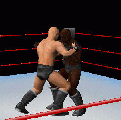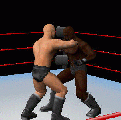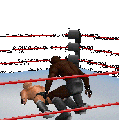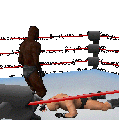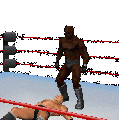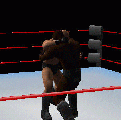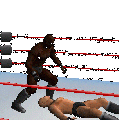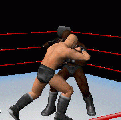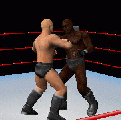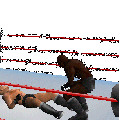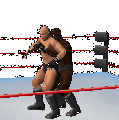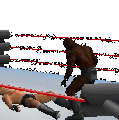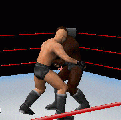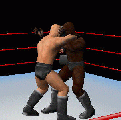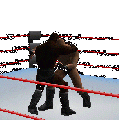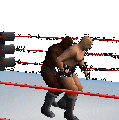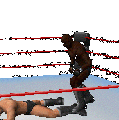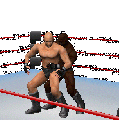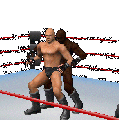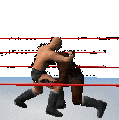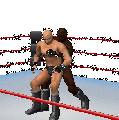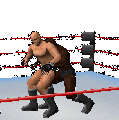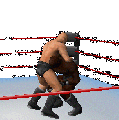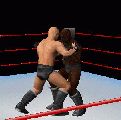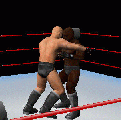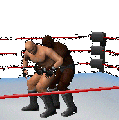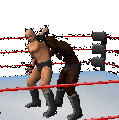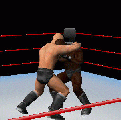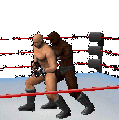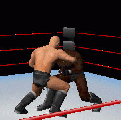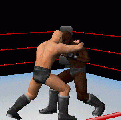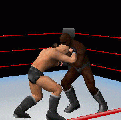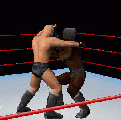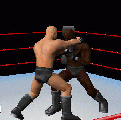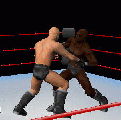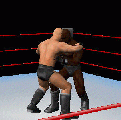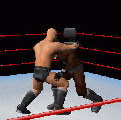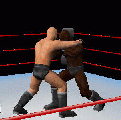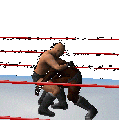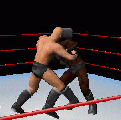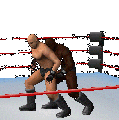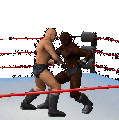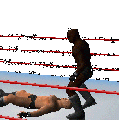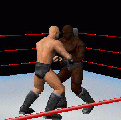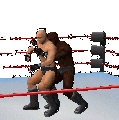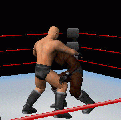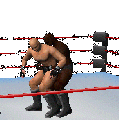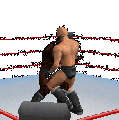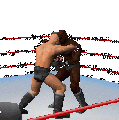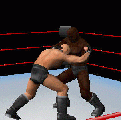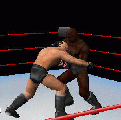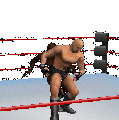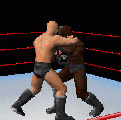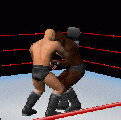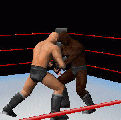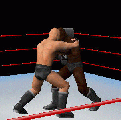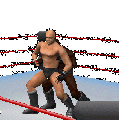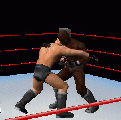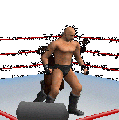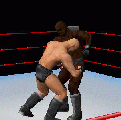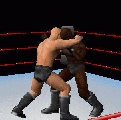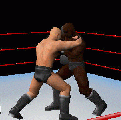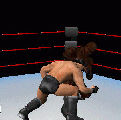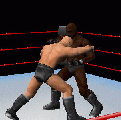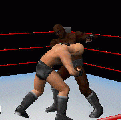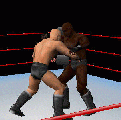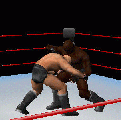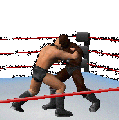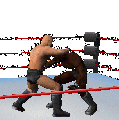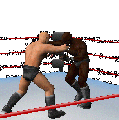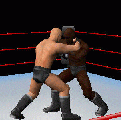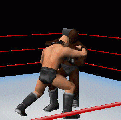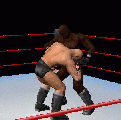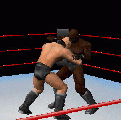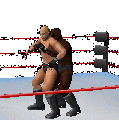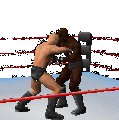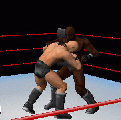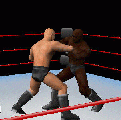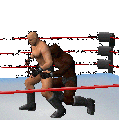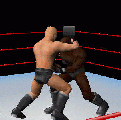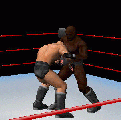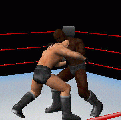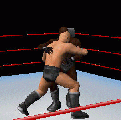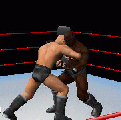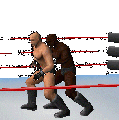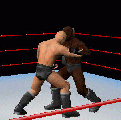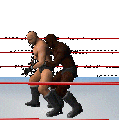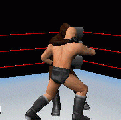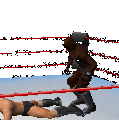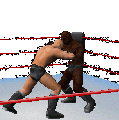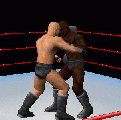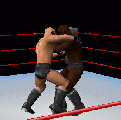Difference between revisions of "Wrestling Moves"
m (→Attacks) |
m |
||
| Line 174: | Line 174: | ||
image:WCM_ArmWrench_Neckbreaker.gif|'''Arm Wrench Neckbreaker:''' Turning opponent around while dragging arm across opponent's chest, then performing a neckbreaker. | image:WCM_ArmWrench_Neckbreaker.gif|'''Arm Wrench Neckbreaker:''' Turning opponent around while dragging arm across opponent's chest, then performing a neckbreaker. | ||
| − | image:WCM_Back_Lariat.gif|'''Back Lariat:''' Swinging an arm against the back of the opponent's head/neck/shoulder in a Lariat. | + | image:WCM_Back_Lariat.gif|'''Back Lariat:''' Also known as Northern Lariat. Swinging an arm against the back of the opponent's head/neck/shoulder in a Lariat. |
image:WCM_BlueThunder.gif|'''Blue Thunder:''' From behind, lifting the opponent in a carry, before performing a powerbomb slam. | image:WCM_BlueThunder.gif|'''Blue Thunder:''' From behind, lifting the opponent in a carry, before performing a powerbomb slam. | ||
| Line 180: | Line 180: | ||
image:WCM_Brainbuster_Reverse.gif|'''Reverse Brainbuster: A suplex move performed by pulling the opponent into an inverted headlock, then lifting them up, overhead, and then dropping opponent behind. | image:WCM_Brainbuster_Reverse.gif|'''Reverse Brainbuster: A suplex move performed by pulling the opponent into an inverted headlock, then lifting them up, overhead, and then dropping opponent behind. | ||
| − | image:WCM_Bull_Backbreaker.gif|''' | + | image:WCM_Bull_Backbreaker.gif|'''Canadian Backbreaker Drop:''' Also known as Bull Backbreaker. Moving the opponent to powerbomb position, the opponent is lifted, rotated and held, opponent's back resting on the shoulder as in a Canadian Backbreaker, before dropping to a knee in order to slam the opponent's back on the shoulder. |
image:WCM_Bulldog.gif|'''Bulldog:''' Grabbing the opponent in a mobile headlock, then moving forward and dragging the opponent by the head, jumping and dropping to a sit in order to slam the opponent face-down. | image:WCM_Bulldog.gif|'''Bulldog:''' Grabbing the opponent in a mobile headlock, then moving forward and dragging the opponent by the head, jumping and dropping to a sit in order to slam the opponent face-down. | ||
| − | image:WCM_Buzzkiller.gif|''' | + | image:WCM_Buzzkiller.gif|'''Lifting DDT:''' Also known as a Buzzkiller. Grabbing opponent in a headlock, before falling back and to the side, lifting and dragging the opponent through the air in order to slam opponent's head against the mat. |
image:WCM_Chokehold_Molly_Bomb.gif|'''Molly Bomb:''' A Hangman Choke, grabbing the opponent by the neck with both hands and lifting for either submission or wear-down, followed by slamming the opponent in a powerbomb. | image:WCM_Chokehold_Molly_Bomb.gif|'''Molly Bomb:''' A Hangman Choke, grabbing the opponent by the neck with both hands and lifting for either submission or wear-down, followed by slamming the opponent in a powerbomb. | ||
Revision as of 17:44, 1 October 2015
Contents
Wrestling Terminology
Wrestling moves include a tremendous array of variation. The moves upon which these variations are based, are generally basic in nature. Combining moves can also be performed, using word elements to describe what kind of actions (movements) a move involves:
Holds:
- Crab: Typically starts with one wrestler lying in a supine position on the mat, with the other wrestler standing and facing him. It is a type of spinal lock where the wrestler hooks each of the opponent’s legs in one of his arms, and then turns the opponent face-down, stepping over him in the process. The final position has the wrestler in a semi-sitting position and facing away from his opponent, with the opponent’s back and legs bent back toward his head.
- Nelson: Grappling hold, executed from behind the opponent, generally when both are on the mat face down with the opponent under the aggressor. One or both arms are used to encircle the opponent's arm under the armpit, and secured at the opponent's neck.
- Pin: A victory condition that is met by holding an opponent's shoulders or scapulae (shoulder blades) on the wrestling mat for a prescribed period of time.
- Sharpshooter: Begins with the opponent supine on the mat with the applying wrestler stepping between the opponent's legs with his/her left leg and wraps the opponent's legs at shin level around that leg. If the applier decides to cross the opponent's legs around his right leg, he has to cross the opponent's right leg over their left, or, otherwise, he has to cross his opponent's left leg over their right. Holding the opponent's legs in place, the wrestler then grabs the opponent's leg which he has crossed over the other and steps over him, flipping him over into a prone position before leaning back to compress his lower back. Also known by several other names including cloverleaf leg-lace Boston crab, standing reverse figure-four leglock, and Scorpion Deathlock.
Throws:
- Backbreaker:
- Brainbuster:
- Chokeslam:
- Cutter:
- DDT:
- Facebuster:
- Neckbreaker:
- Piledriver:
- Powerbomb:
- Powerslam:
- Stunner:
- Suplex:
Submission Holds
Half Boston Crab: Also known as Half Crab or Single Leg Boston Crab. Performed by hooking one of the opponent's legs under one arm, turning opponent face-down, stepping over them and moving to a semi-sitting position over opponent's back, facing away and pulling leg back in order to stretch the limb.
Sleeperhold: Performed from behind opponent, by wrapping an arm around the opponent's neck, pressing biceps against one side of the neck, and the inner bone of the forearm against the other side. The neck is squeezed tightly. May be combined with leg-scissors around the opponent's torso or thighs. Used as a Submission hold.
Tackle: A takedown involving lifting the opponent off the mat, so as to rotate them and slam them down back-first. Opponent may be pinned depending on how high up the tackle was performed. May be used as a Submission (Ground Bearhug) or Pin depending on where and how tightly the grapple was applied.
Throws
Monkey Flip: Also known as a Monkey Climb, performed by hooking both hands around the opponent's head, before bringing up both legs to place feet against opponent's hips/waist, followed by shifting weight so as to fall backwards, forcing opponent to fall with them. A toss is performed, by pushing up with legs and releasing the hands, so as to shove the falling opponent into the air.
Scoop Slam: Body slams are any move where the opponent is picked up and thrown to the ground. The Scoop Slam is performed by facing the opponent, reaching between their legs with one arm, and reaching around the opponent's back from the same side with the other arm. The opponent is lifted, turned upside down, and then thrown to the mat back-first.
Pins
Tilt-A-Whirl: A head-scissors takedown, performed by jumping into the air, performing a head-scissors around the opponent's head, and using that grip to drag the opponent down to the mat. May be performed while running or standing. May be combined with Tornado movement (spinning around opponent, causing them to pivot), or a somersault. Can end in a Pin (double-leg cradle).
Schoolboy: Also called Schoolboy Sweep, performed by moving behind opponent, dropping to a knee, putting a hand through opponent's legs, hooking the opponent's hips, and pulling backwards. This causes the opponent to fall over and backwards with straightened and trapped legs, onto their back. May be finished with a Pin.
Tackle: A takedown involving lifting the opponent off the mat, so as to rotate them and slam them down back-first. Opponent may be pinned depending on how high up the tackle was performed. May be used as a Submission (Ground Bearhug) or Pin depending on where and how tightly the grapple was applied.
Tombstone Piledriver: Also known as a Kneeling Reverse Piledriver, performed by placing an arm between the opponent's leg, and the other arm on the opponent's opposite shoulder. The opponent is then lifted, similar to a Scoop Slam lift, into the Reverse Piledriver position, before falling or jumping down onto the knees, so as to drive the opponent's head and shoulders into the mat.
Attacks
Falcon Arrow Suplex: Also called the Sitout Suplex Slam, or Suplex Driver, performed by applying front facelock, then draping opponent's near arm over the shoulder. Follow up by holding opponent's torso with free arm, lifting them into vertical position. Loosen facelock to twist opponent, falling to a sitting position and driving opponent's back and shoulders into the mat.
Tilt-A-Whirl: A head-scissors takedown, performed by jumping into the air, performing a head-scissors around the opponent's head, and using that grip to drag the opponent down to the mat. May be performed while running or standing. May be combined with Tornado movement (spinning around opponent, causing them to pivot), or a somersault. Can end in a Pin (double-leg cradle).
Jackhammer Suplex: Also known as a Suplex Slam, lifting opponent up and over in normal suplex vertical position, before shifting slightly in order to throw opponent to mat on their stomach. May be adjusted to throw opponent down on their back, similar to a High-angle Body Slam. Can also be used for other suplexes such as Fisherman Suplex or Gutwrench Suplex.
Pendulum Backbreaker: A backbreaker performed by standing side-to-side and slightly behind opponent, facing in same direction, followed by reaching around the opponent's torso with one arm across the opponent's chest (under both arms), and placing the other arm under the opponent's leg. Opponent can then be lifted up, and angled so as to be dropped down back-first against the knee.
Russian Leg Sweep: Performed by standing side-to-side and slightly behind opponent, facing same direction, then reaching behind the opponent's back to hook the opponent's head, with the other hand extending the opponent's nearest arm. Then, while hooking the opponent's leg, falling backwards, pulling the opponent to the mat back-first.
STF: The Stepover Toehold Facelock, performed by grabbing a face-down opponent's leg, and placing the opponent's ankle between the thighs, before lying on top of the opponent's back and locking both arms around the opponent's head and neck, before pulling back to stretch the opponent's back, neck and knee.
Scoop Slam: Body slams are any move where the opponent is picked up and thrown to the ground. The Scoop Slam is performed by facing the opponent, reaching between their legs with one arm, and reaching around the opponent's back from the same side with the other arm. The opponent is lifted, turned upside down, and then thrown to the mat back-first.
Tackle: A takedown involving lifting the opponent off the mat, so as to rotate them and slam them down back-first. Opponent may be pinned depending on how high up the tackle was performed. May be used as a Submission (Ground Bearhug) or Pin depending on where and how tightly the grapple was applied.
Tombstone Piledriver: Also known as a Kneeling Reverse Piledriver, performed by placing an arm between the opponent's leg, and the other arm on the opponent's opposite shoulder. The opponent is then lifted, similar to a Scoop Slam lift, into the Reverse Piledriver position, before falling or jumping down onto the knees, so as to drive the opponent's head and shoulders into the mat.
